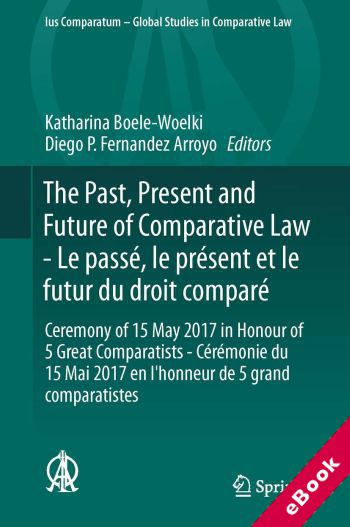We are now closed for the Christmas and New Year period, returning on Monday 5th January 2026. Orders placed during this time will be processed upon our return on 5th January.

The device(s) you use to access the eBook content must be authorized with an Adobe ID before you download the product otherwise it will fail to register correctly.
For further information see https://www.wildy.com/ebook-formats
Once the order is confirmed an automated e-mail will be sent to you to allow you to download the eBook.
All eBooks are supplied firm sale and cannot be returned. If you believe there is a fault with your eBook then contact us on ebooks@wildy.com and we will help in resolving the issue. This does not affect your statutory rights.
This book is published by the International Academy of Comparative Law to honor five great comparatists: Jean-Louis Baudouin from Canada, Xavier Blanc-Jouvan from France, Mary Ann Glendon from the United States of America, Hein Kötz from Germany, and Rodolfo Sacco from Italy. The five great minds present their thoughts on the past, the present and future of comparative law and in doing so they particularly focus on the future of the International Academy of Comparative Law, comparative law methodology and the teaching of comparative law. The book is essential reading for researchers and academics wanting to know what these respected legal scholars have contributed to comparative law, how they differ and when and why they excelled. Moreover, the views presented suggest how the role of the Academy can be developed in order to deal with the current challenges of comparative law.
Ce livre est publié par l'Académie internationale de droit comparé en l'honneur de cinq grands comparatistes : Jean-Louis Baudouin du Canada, Xavier Blanc-Jouvan de France, Mary Ann Glendon des États-Unis, Hein Kötz d'Allemagne et Rodolfo Sacco d'Italie. Ces cinq grands esprits offrent leurs réflexions sur le passé, le présent et le futur du droit comparé et, ce faisant, se concentrent particulièrement sur l'avenir de l'Académie internationale de droit comparé, la méthodologie ainsi que l'enseignement du droit comparé. Ce livre est une lecture essentielle pour les chercheurs et les universitaires qui s’intéressent aux contributions au droit comparé de ces juristes respectés, la manières dont ils diffèrent et quand et pourquoi ils ont excellé. De plus, les points de vue présentés suggèrent comment le rôle de l'Académie peut être développé pour faire face aux défis actuels du droit comparé.